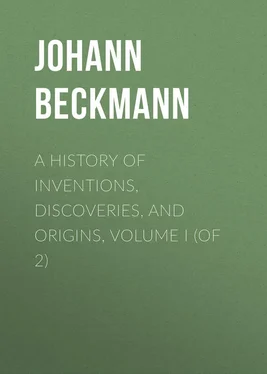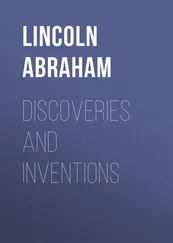Johann Beckmann - A History of Inventions, Discoveries, and Origins, Volume I (of 2)
Здесь есть возможность читать онлайн «Johann Beckmann - A History of Inventions, Discoveries, and Origins, Volume I (of 2)» — ознакомительный отрывок электронной книги совершенно бесплатно, а после прочтения отрывка купить полную версию. В некоторых случаях можно слушать аудио, скачать через торрент в формате fb2 и присутствует краткое содержание. Жанр: foreign_antique, foreign_prose, на английском языке. Описание произведения, (предисловие) а так же отзывы посетителей доступны на портале библиотеки ЛибКат.
- Название:A History of Inventions, Discoveries, and Origins, Volume I (of 2)
- Автор:
- Жанр:
- Год:неизвестен
- ISBN:нет данных
- Рейтинг книги:4 / 5. Голосов: 1
-
Избранное:Добавить в избранное
- Отзывы:
-
Ваша оценка:
- 80
- 1
- 2
- 3
- 4
- 5
A History of Inventions, Discoveries, and Origins, Volume I (of 2): краткое содержание, описание и аннотация
Предлагаем к чтению аннотацию, описание, краткое содержание или предисловие (зависит от того, что написал сам автор книги «A History of Inventions, Discoveries, and Origins, Volume I (of 2)»). Если вы не нашли необходимую информацию о книге — напишите в комментариях, мы постараемся отыскать её.
A History of Inventions, Discoveries, and Origins, Volume I (of 2) — читать онлайн ознакомительный отрывок
Ниже представлен текст книги, разбитый по страницам. Система сохранения места последней прочитанной страницы, позволяет с удобством читать онлайн бесплатно книгу «A History of Inventions, Discoveries, and Origins, Volume I (of 2)», без необходимости каждый раз заново искать на чём Вы остановились. Поставьте закладку, и сможете в любой момент перейти на страницу, на которой закончили чтение.
Интервал:
Закладка:
The remains of a pair of old Roman mill-stones were found in the beginning of the last century at Adel in Yorkshire, a description of which was given by Thornsby 391, in the Philosophical Transactions. One of the stones was twenty inches in breadth; thicker in the middle than at the edges, and consequently convex on one side. The other was of the same form, but had that thickness at the edges which the other had in the middle, and some traces of notching could be observed upon it.
I shall not here collect all those passages of the ancients which speak of hand- and cattle-mills, because they have been already collected by others, and afford very little information 392. Neither shall I inquire to what Ceres the Grecians ascribed the invention of mills 393; who Milantes was, to whom that honour has been given by Stephanus Byzantinus 394; or how those mills were constructed which were first built by Myletes the son of Lelex, king of Laconia 395. Such researches would be attended with little advantage. I shall proceed therefore to the invention of water-mills.
These appear to have been introduced in the time of Mithridates, Julius Cæsar, and Cicero. Because Strabo 396relates that there was a water-mill near the residence of Mithridates, some have ascribed the honour of the invention to him; but nothing more can with certainty be concluded from this circumstance, than that water-mills were at that period known, at least in Asia. We are told by Pomponius Sabinus, in his remarks upon a poem of Virgil called Moretus, that the first mill seen at Rome was erected on the Tiber, a little before the time of Augustus; but of this he produces no proof. As he has taken the greater part of his remarks from the illustrations of Servius, and must have had a much completer copy of that author than any that has been printed, he may have derived this information from the same source 397. The most certain proof that Rome had water-mills in the time of Augustus is the description which has been given of them by Vitruvius (lib. x. 10). We learn from this passage, that the ancients had wheels for raising water, which were driven by being trod upon by men. That condemnation to these machines was a punishment, appears from Artemidorus, lib. i. c. 50, and Sueton. Vita Tiber. cap. 51. And the pretty epigram of Antipater; “Cease your work, ye maids, ye who laboured in the mill; sleep now, and let the birds sing to the ruddy morning; for Ceres has commanded the water-nymphs to perform your task: these, obedient to her call, throw themselves on the wheel, force round the axle-tree, and by these means the heavy mill.” This Antipater 398, as Salmasius with great probability asserts, lived in the time of Cicero. Palladius 399also speaks with equal clearness of water-mills, which he advises to be built on possessions that have running water, in order to grind corn without men or cattle.
There are also other passages of the ancients which are commonly supposed, but without certain grounds, to allude to water-mills. Among these is the following verse of Lucretius 400:
Ut fluvios versare rotas atque haustra videmus.
It appears also that the water-wheels to which Heliogabalus caused some of his friends and parasites to be bound 401, cannot be considered as mills. These, as well as the haustra of Lucretius, were machines for raising water, like those mentioned in the before-quoted passage of Vitruvius 402. It is however evident that there were water-mills at Rome at this period; and it affords matter of surprise that we do not find mention oftener made of them, and that they did not entirely banish the use of the laborious hand- and cattle-mills. That this was not the case, and that the latter were very numerous for some time after, may be concluded from various circumstances. When Caligula, about twenty-three years after the death of Augustus, took away all the horses and cattle from the mills, in order to transport effects of every kind which he had seized, there arose a scarcity of bread at Rome; from which Beroaldus justly infers that water-mills must have been then very rare 403. Nay, more than three hundred years after Augustus, cattle-mills were so common at Rome, that their number amounted to three hundred 404. Mention of them, and of the hand-mills always occurs, therefore, for a long time after in the laws. The Jurist Paulus, who lived about the year 240, particularizing the bequest of a baker, mentions asina molendaria and mola , a mill-ass and a mill 405. In the year 319 Constantine ordered that all the slaves condemned to the mills should be brought from Sardinia to Rome 406. Such orders respecting mill-slaves occur also under Valentinian 407. When by the introduction of Christianity, however, the morals of men became improved, slaves were less frequent; and Ausonius, who lived under Theodosius the Great, about the end of the third century, expressly says, that in his time the practice had ceased of condemning criminals to slavery, and of causing mills to be driven by men.
Public water-mills, however, appear for the first time under Honorius and Arcadius; and the oldest laws which mention them, about the year 398, show clearly that they were then a new establishment, which it was necessary to secure by the support of government; and the orders for that purpose were renewed and made more severe by Zeno towards the end of the fifth century 408. It is worthy of remark, that in the whole code of Justinian one does not find the least mention of wooden pales or posts, which occur in all the new laws; and which, when there were several mills situated in a line on the same stream, occasioned so many disputes. The mills at Rome were erected on those canals which conveyed water to the city; and because these were employed in several arts, and for various purposes, it was ordered that by dividing the water the mills should be always kept going. The greater part of them lay under Mount Janiculum 409; but, as they were driven by so small a quantity of water, they probably executed very little work; and for this reason, but chiefly on account of the great number of slaves, and the cheap rate at which they were maintained, these noble machines were not so much used, nor were so soon brought to perfection as they might have been. It appears, however, that after the abolition of slavery they were much improved and more employed; and to this a particular incident seems in some measure to have contributed.
When Vitiges, king of the Goths, besieged Belisarius in Rome, in the year 536, and caused the fourteen large expensive aqueducts to be stopped, the city was subjected to great distress; not through the want of water in general, because it was secured against that inconvenience by the Tiber; but by the loss of that water which the baths required, and, above all, of that necessary to drive the mills, which were all situated on these canals. Horses and cattle, which might have been employed in grinding, were not to be found: but Belisarius fell upon the ingenious contrivance of placing boats upon the Tiber, on which he erected mills that were driven by the current. This experiment was attended with complete success; and as many mills of this kind as were necessary were constructed. To destroy these, the besiegers threw into the stream logs of wood and dead bodies, which floated down the river into the city; but the besieged, by making use of booms, to stop them, were enabled to drag them out before they could do any mischief 410. This seems to be the invention of floating-mills, at least I know of no other. It is certain that by these means the use of water-mills became very much extended; for floating-mills can be constructed almost upon any stream, without forming an artificial fall; they can be stationed at the most convenient places, and they rise and fall of themselves with the water. They are however attended with these inconveniences, that they require to be strongly secured; that they often block up the stream too much, and move slowly; and that they frequently stop when the water is too high, or when it is frozen.
Читать дальшеИнтервал:
Закладка:
Похожие книги на «A History of Inventions, Discoveries, and Origins, Volume I (of 2)»
Представляем Вашему вниманию похожие книги на «A History of Inventions, Discoveries, and Origins, Volume I (of 2)» списком для выбора. Мы отобрали схожую по названию и смыслу литературу в надежде предоставить читателям больше вариантов отыскать новые, интересные, ещё непрочитанные произведения.
Обсуждение, отзывы о книге «A History of Inventions, Discoveries, and Origins, Volume I (of 2)» и просто собственные мнения читателей. Оставьте ваши комментарии, напишите, что Вы думаете о произведении, его смысле или главных героях. Укажите что конкретно понравилось, а что нет, и почему Вы так считаете.












